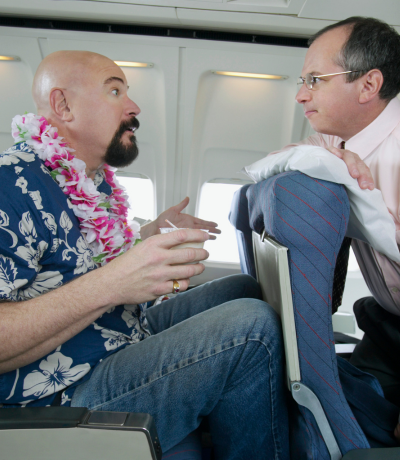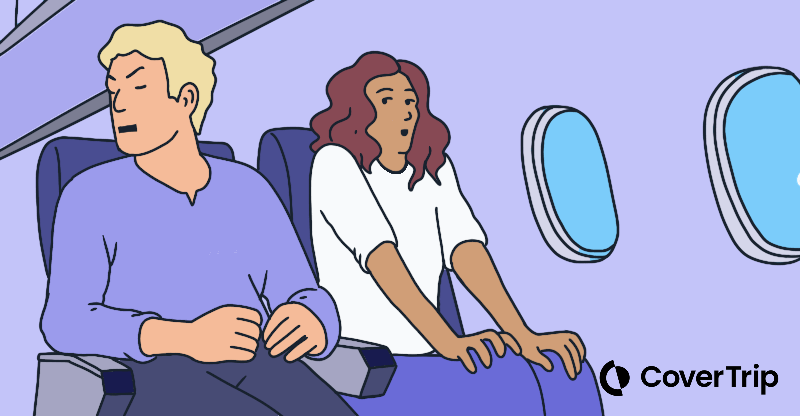Dealing with Unruly or Unpleasant Passengers
7 April 2023
Just this week, the FAA warned that ![]() staffing shortages could make the summer travel season problematic. Apparently, air traffic control staffing levels are well below acceptable targets, which could mean flight delays and cancellations.
staffing shortages could make the summer travel season problematic. Apparently, air traffic control staffing levels are well below acceptable targets, which could mean flight delays and cancellations.
A number of factors can cause a passenger to become disruptive, including intoxication, drug use, mental health issues, anxiety, and fatigue. Unexpected situations like flight delays and rerouting can be frustrating for everyone, and passenger misbehavior can range all the way from verbal grumpiness to ![]() physical violence.
physical violence.
It’s such an established issue that the International Air Transport Association (IATA) has developed a list of ![]() what is considered unruly or disruptive behavior. The list includes:
what is considered unruly or disruptive behavior. The list includes:
- Refusing to comply with safety instructions and crew instructions
- Verbal confrontation of crew members or other passengers
- Physical confrontation of crew members or other passengers
- Making threats of any kind
- Sexual abuse and/or harassment
- Riotous behavior like screaming
With the summer travel season approaching, you might be wondering what you can do if seated next to an unruly passenger. The best way to mitigate disruptions and ugly interactions is early intervention and resolving the root problem.
Here are some strategies you can use to manage that unpleasant behavior.

Employ one of the three D’s
This is a handy technique that works in all kinds of situations, from toddler meltdowns to physical attacks. It’s taught as a way to help bystanders intervene in a manner that’s comfortable to them and successfully calm a pending bad situation.
Direct
This technique is just like it sounds: you confront the situation directly. Here are some scripts for common situations:
- If the passenger is drunk (or high) and abusive: “I think the alcohol may be affecting your behavior. Please stop.”
- If the passenger is argumentative: “I hear you, but I don’t want to get into a conversation right now.”
- If they’re invading your space: “Excuse me, I have some anxiety about personal space. Let’s put the armrest down so we can both feel comfortable.”
The direct approach is best implemented when you feel safe.
Pro tip: if you let the flight attendants know, they can stop serving your drunk seatmate too.
Distract the unruly passenger
If you don’t feel safe or want to address the situation directly, you can implement the distraction technique. Just like it sounds, you create a distraction that can diffuse the situation. Here are some examples of distractions:
- Spill your drink (not on the angry person)
- Drop something near the misbehaving passenger so they look away
- Point at something (perhaps out the window) and say, “Ooh, look!” or “Oh, wow!”
A well-played distraction can allow a little time for things to calm down and even help others escape.
Delegate
If you can’t intervene solo for any reason, try the technique of delegating. Ask a traveling partner or another passenger that looks sympathetic to chime in on the situation. You can do this on the down-low or loud and direct, depending on your comfort level and relationship.
What to do if someone appears unhinged (or about to be)
The single most important thing to do when someone appears unhinged is to de-escalate (and quietly push the call button).
The ![]() trick to de-escalation is to get the person talking. Physical actions are harder when the person is explaining something, so it reduces the likelihood they’ll attack.
trick to de-escalation is to get the person talking. Physical actions are harder when the person is explaining something, so it reduces the likelihood they’ll attack.
Keep your voice low and direct, and engage the person with a question. Here’s a simple example: “Gosh, sounds like you’re not having fun. Can you tell me about it?”
Most people just want to be heard, so giving them the space to air their message can sometimes work to de-escalate, or at least give the flight attendants time to come to the rescue.
Bonus: this technique works on almost everyone, including pissed-off partners and frustrated toddlers.

When to push the call button
Some situations call for professional help. When a passenger near you goes from annoyed to aggressive or abusive, it’s best to seek help from the airline crew immediately. They are trained to handle these situations and have the power to move you to a different seat, etc.
Related topics
Damian Tysdal is the founder of CoverTrip, and is a licensed agent for travel insurance (MA 1883287). He believes travel insurance should be easier to understand, and started the first travel insurance blog in 2006.
